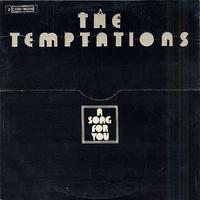This article needs additional citations for verification .(April 2010) |
| A Song for You | ||||
|---|---|---|---|---|
 | ||||
| Studio album by | ||||
| Released | January 16, 1975 | |||
| Recorded | 1974 | |||
| Studio | Motown Recording Studios (Hollywood, CA) | |||
| Genre | Soul, funk | |||
| Length | 35:53 | |||
| Label | Gordy G6 969 S1 | |||
| Producer | Berry Gordy, Jeffrey Bowen, James Anthony Carmichael, Suzee Wendy Ikeda, Clayton Ivey, Terry Woodford | |||
| The Temptations chronology | ||||
| ||||
| Singles from A Song for You | ||||
| ||||
A Song for You is a 1975 album by the Temptations. It features two R&B #1 hits: "Happy People" (originally intended for recording by its authors, the Commodores), and "Shakey Ground", one of the group's final R&B #1 songs.